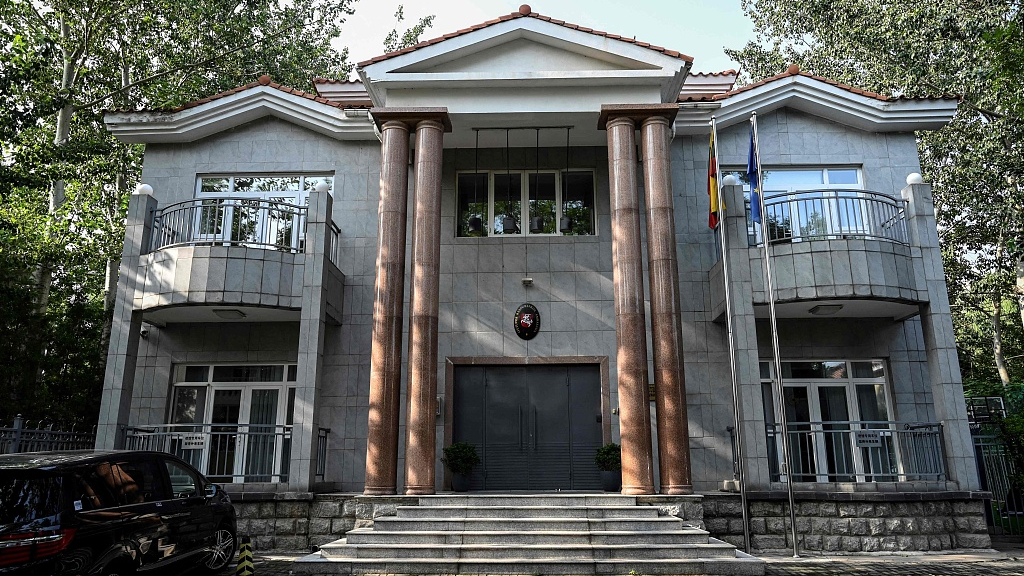
Lithuania's embassy in Beijing, August 10, 2021. /CFP
Lithuania's embassy in Beijing, August 10, 2021. /CFP
Editor's Note: Zhou Wenxing is an assistant professor at the School of International Studies, Nanjing University and a former Asia Fellow at the John F. Kennedy School, Harvard University. He writes extensively on comparative politics and international relations, with an emphasis on the Taiwan issue and China-U.S. relations. The article reflects the author's opinions, and not necessarily the views of CGTN.
A 10-member delegation from the three Baltic states, i.e. Estonia, Latvia, and Lithuania, arrived in China's Taiwan region and met with regional leader Tsai Ing-wen on November 29. This is the first time that members of parliament from all three Baltic nations have made a joint visit to the island. The visit comes at a time when Taiwan's Democratic Progressive Party (DPP) authority has doubled down its efforts to solicit foreign support.
Ostensibly, the main purpose of the Baltic delegation is to attend the two-day "2021 Open Parliament Forum" organized by the Taiwan island's "external affairs department." But in effect, the delegation aims to express the Baltic states' political support for the Taiwan "authorities," which are now facing growing pressure from the Chinese mainland due to their attempts to secede from China.
As Matas Maldeikis, chairman of the so-called "Taiwan Friendship Group" in the Lithuanian parliament and head of the Lithuanian delegation, told reporters on the island on November 29, the Baltic lawmakers' visit aims to show their "solidarity" with the DPP authorities based on their "shared values and interests."
Besides, the delegation also intends to strengthen economic and trade connections with the island. This is particularly so for Lithuania. Ever since its hasty decision in August to allow the Taiwan region to set up a "representative office" in its capital Vilnius under the name of "Taiwan," the Baltic state has been unable to continuously benefit from the lucrative Chinese market.

Building with the so-called Taiwanese Representative Office in Vilnius, Lithuania, November 18 ,2021. /CFP
Building with the so-called Taiwanese Representative Office in Vilnius, Lithuania, November 18 ,2021. /CFP
To alleviate the worsening situation and boost investment and trade, Lithuania sought help from the U.S., which emboldened the Baltic nation to take a tougher policy attitude toward China on the Taiwan issue. Indeed, Lithuania was paid off for its recent aggressive role on the issue. For example, it signed a $600 million export credit agreement with the U.S. Export-Import Bank in September after Foreign Minister Gabrielius Landsbergis paid a visit to Washington, D.C.
Given the challenges the Taiwan region itself is confronted with, it remains unknown what the DPP authorities could do to substantially help the faraway Baltic nation solve its urgent problem. It is certain, however, that Maldeikis' visit to the island just further deteriorated strained Lithuanian-China relations that were already downgraded to the level of chargé d'affaires in November.
It should be noted that the Chinese government is well aware that the countermeasures it adopted against Lithuania's intervention in its domestic issue, such as downgrading diplomatic relations, are not without negative ramifications. A sour relationship with Lithuania, one of the 27 member states of the European Union, would add more uncertainties to the building of a constructive EU-China relationship should the Baltic state vote against it.
Therefore, the Chinese government is handling China-Lithuanian relations with caution. For example, the Chinese government recalled its ambassador to the Baltic state only when its diplomatic efforts failed when Lithuania announced in August that it would allow the Taiwan region to set up a "representative office" in Vilnius. The Chinese government did not downgrade its relations with the Lithuanian government as a solemn protest until the "representative office" was established in Vilnius with the latter's permission in November.
In other words, the Chinese government is well prepared to accept all consequences concerning the Taiwan issue. As for Lithuania and perhaps other countries that are poised to challenge the one-China policy, are they prepared to take full responsibilities for their reckless decisions to cross the red line over the issue? Lithuania has already fallen victim to its own ill-considered policy.
Any country that maintains diplomatic relations with China should learn some lessons from the Lithuania case. And the most important lesson is that they should never meddle in China's Taiwan issue unless they are willing to do so at their own risk.
(If you want to contribute and have specific expertise, please contact us at opinions@cgtn.com.)

